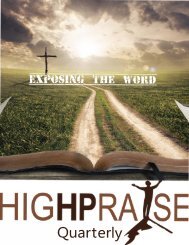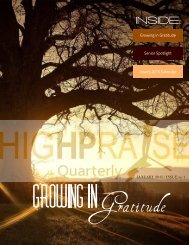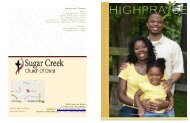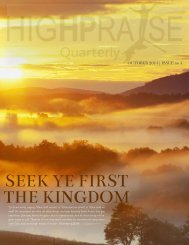Q1 2016
Final HP Jan 2016
Final HP Jan 2016
You also want an ePaper? Increase the reach of your titles
YUMPU automatically turns print PDFs into web optimized ePapers that Google loves.
By Tina Price
Imagine<br />
that you are an African American male driving down<br />
a dark street. All of a sudden, you lose control of your car.<br />
You crash into several trees. Your car is totaled, and your<br />
only way of escape is to climb out of the shattered back<br />
window of your car. Unfamiliar with the area, you run<br />
desperately to the first house you see for help. A white<br />
woman comes to the door. She feels threatened by you and<br />
mistakes you for an intruder, so instead of helping you, she<br />
frantically calls 911. You see three police officers. As you<br />
approach, one of the officers, a white male named Randall<br />
Kerrick, shoots you in cold blood, not once, not twice, but<br />
twelve times. These are the facts that led to the untimely<br />
death of Jonathon Ferrell, a twenty-four year old, unarmed<br />
African American male. These shocking events took place<br />
here, in Charlotte, North Carolina. Unfortunately according to<br />
North Carolina laws and the laws of the majority of other<br />
states, ?unarmed is not harmless, and a body can be a<br />
weapon.? So if a person appears to be a threat, a police<br />
officer has the right to use any amount of force for his own<br />
protection. In this article, I will first explain the components<br />
and effects of the Stand Your Ground laws. Also, I will offer<br />
suggestions to ultimately remedy the effects of the Stand<br />
Your Ground laws.<br />
The Stand Your Ground laws specific to North<br />
Carolina provided a basis to free Officer Kerrick from the<br />
charges of voluntary manslaughter. Under these laws, a<br />
police officer may kill a person while on duty if he believes<br />
his own life is in danger. The officer?s fear or belief must be<br />
reasonable. The reasonable standard is one of the lowest<br />
standards in a court of law. Therefore, a police officer may<br />
rely upon racial stereotypes to justify unmerited fear of an<br />
African American alleged assailant. Thus, an African American<br />
male may pose a threat merely based upon the color of his<br />
skin. Even if unarmed, he is presumed to be dangerous. He<br />
looks suspicious. He is violent. If he wears his pants below<br />
his waist, he?s a thug; he?s in a gang. If he makes any sudden<br />
move this poses a risk or the possibility of an attack. In 2015,<br />
a jury was unable to decide whether Officer Kerrick should<br />
be found guilty of voluntary manslaughter. As a result, the<br />
District Attorney decided not to retry the case. Therefore,<br />
Officer Kerrick was free to go, and the government did not<br />
hold him accountable for his actions.<br />
We have all seen the news and heard the stories of<br />
police officers shooting and killing countless unarmed and<br />
presumed to be dangerous African Americans. Trayvon<br />
Martin, Michael Brown, Eric Garner, Timothy Russell, and<br />
Malissa Williams are all unarmed African American victims<br />
killed by police officers. We all know their stories. We felt<br />
the pain and anger. To make matters worse, the officers in<br />
each case escaped a conviction for their crimes. The officers<br />
in each case supposedly had a ?reasonable? fear for their<br />
own lives. Consequently, the officers?actions were justified<br />
because each officer killed his unarmed victim in<br />
self-defense. There is a need to ease the paralyzing effects<br />
of the Stand Your Ground laws. The recent events have led to<br />
feelings of powerlessness, hopelessness, fear, and outrage.<br />
There is no quick answer or solution. However, if the Stand<br />
Your Ground laws did not exist, police officers would not feel<br />
as if they had the right to kill unarmed African Americans. In<br />
short, the United State?s government should get rid of the<br />
Stand Your Ground Laws. If you think back to the Civil Rights<br />
Movement, the African American community participated in<br />
non-violent protests that ultimately urged the government to<br />
create laws to end racial segregation. There is a need for a<br />
similar movement to remove the Stand Your Ground laws<br />
from the books in many states. The Standard Your Ground<br />
laws have ultimately legalized murder. Based upon the laws,<br />
police officers can racially profile African Americans. African<br />
Americans?lives are at stake, and we do not have protection<br />
under the laws of this country. So police officers can<br />
basically kill unarmed African Americans ?presumed to be<br />
dangerous? without any consequences for their actions.
Actions that we can take...<br />
Unarmed and Presumed Dangerous CONTINUED<br />
Aside from large-scale changes in the laws, there are actions that we can take on a smaller scale to<br />
address the effects of the Stand Your Ground laws. First, there is a need for political involvement by the<br />
African American community. Specifically, more African Americans should vote for public officials that have<br />
the power to change the laws. Additionally, African Americans should participate in jury panels for cases like<br />
Travyon Martin and Jonathon Ferrell?s cases. Second, police departments should engage their officers in<br />
cultural competency trainings, and the departments should implement policies that create a system of<br />
accountability. For example, some departments require that their officers wear a body camera while on duty.<br />
Third, police officers should make efforts to bridge the gap between the community police departments.<br />
There is generally a sense of distrust among police departments and the African American community.<br />
Perhaps if police officers interacted more with the community these interactions could dispel feelings of<br />
distrust. These interactions could be informal, such as neighborhood block parties or a community service<br />
events sponsored by the police department. Despite the current effects of Stand Your Ground laws, people<br />
can take steps to decrease the effects.<br />
In line with our mission, the L.I.G.H.T. Ministry[1] plans to address the effects of the Stand Your Ground laws<br />
through a workshop at Sugar Creek Church of Christ on April 23, <strong>2016</strong> at 11:00 am. Part of our mission is to<br />
educate the community of their rights as they relate to various legal matters. Police officers that kill unarmed<br />
and innocent African Americans presumed to be dangerous is a major legal issue within society. During the<br />
Civil Rights Movement, churches were at the forefront of the movement. Likewise, the Church of Christ should<br />
be at the forefront of this movement. The ?Unarmed and Presumed Dangerous Workshop? is open to the<br />
community as well as members of Sugar Creek Church of Christ. We will address the following in the<br />
workshop: (1) the legal framework in which police officers operate, for example, Fourth Amendment and<br />
Stand Your Ground; (2) individual rights such as the right to be free from unreasonable searches and seizures;<br />
(3) what to do when engaged or stopped by police officers; and (4) how police departments and the<br />
community can foster stronger relationships. This workshop is a great opportunity for the Church of Christ to<br />
address a societal issue that affects us all. In conclusion, the Stand Your Ground laws have given police<br />
officers a license to kill innocent and unarmed African Americans. There is a need to abolish these laws.<br />
Furthermore, there are measures that the community can take on a smaller scale to address the effects of<br />
these laws.<br />
[1] The L.I.G.H.T. (Lawyers Inspired by God?s Heartfelt Truth) Ministry consists of three attorneys<br />
who are members of the Church, Anthony Burts, Bobby Robinson, and Fatina J. Lorick.<br />
By Fatina Lorrick
By Brian Smith
By Renee Howard

















